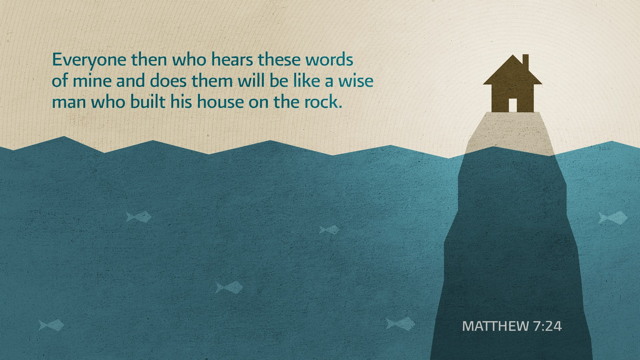HOLY SCRIPTURE says of the midwives who kept alive the Israelites’ male children, that through the god-fearing midwives they made themselves houses. What Does it mean they made visible houses? How can they say they acquired houses through the fear of God when we do the opposite, and learn in time, through fear of God …
HOLY SCRIPTURE says of the midwives who kept alive the Israelites’ male children, that through the god-fearing midwives they made themselves houses. What Does it mean they made visible houses? How can they say they acquired houses through the fear of God when we do the opposite, and learn in time, through fear of God to give up the houses we have? Evidently this does not refer to visible houses but to the house of the soul which each one builds up for himself by keeping God’s commandments. This Holy Scripture teaches us that the fear of God prepares the soul to keep the commandments, and through the commandments the house of the soul is built up. Let us take hold of them, brothers, and let us fear God, and we shall build houses for ourselves where we shall find shelter in winter weather, in the season of storm cloud, lightning, and rain; for not to have a home in winter-time is a great hardship.
How the house of the soul is built we can learn from the building of a material house and from the knowledge and care it demands. A man who wants to build a house must see that it is solid and thoroughly safe and he raises it four-square on a sound foundation. He does not concentrate on one part and neglect the rest since this is of no use but defeats his aim and makes vain the expense and labor. So it is with the soul: we must on no account neglect any part of it, but build it up equally and harmoniously. This is what Abba John means when he says, ‘I would rather a man acquire a little of each one of the virtues than master one virtue as some have done, persisting in it and practising only that but neglecting the rest.
They may indeed have a certain pre-eminence in that one virtue and, therefore, not be weighed down by the contrary vice, but they remain caught by their other passions and burdened by them and do not pay attention to them, thinking instead that they have acquired something grand. They are like a man who builds one wall and raises it up as high as he can and, considering the height of the wall, thinks what a great work he has done. He does not know that one good strong wind coming along will blow it down because it stands by itself, nor from only one wall has that man gained a shelter for himself, for he is exposed on the other sides. That is not the way to do it. If a man wants to build a home and make a refuge for himself he must build up all four walls and protect himself all round.
And I will tell you how to do it: First he must lay the foundation, which is faith. Without faith, as the Apostle says, it is impossible to please God. So, according to our comparison, it is impossible to build our spiritual house without this foundation which is faith. Is there occasion for obedience? A stone must be laid, obedience. Does a disagreement arise among the brethren? The stone of patience must be laid. Is there need for self-control? That stone too must be laid. So whatever the virtue required, that stone must be laid in the building, and in this way the perimeter of the building rises up. One stone for fore-bearance, another for mortifying self-will, one for meekness, and so on. In all this, great attention must be paid to perseverance and courage: these are the cornerstones of the building and by them the house is held together and all is united to all so that they do not lean over and fall apart; without these a man will not succeed in perfecting any of the virtues. If a man has no courage in his soul, he will not endure with patience, and if he has no patience he cannot entirely succeed. Therefore, it is said, ‘In patience you shall possess your souls.’ Similarly, the builder must set his stones in mortar. If he piles up his stones without mortar, the stones come apart and the house falls down. The mortar is humility, which is composed from the earth and lies under the feet of all. Any virtue existing without humility is no virtue at all, as it says in the sayings of the Elders: ‘As it is impossible to construct a ship without nails, so there is no hope of being saved without humility.’ Whatever a good man does, he must do with humility so that what he does is kept safe. But besides all this, the house needs what are called tie-beams or braces that is to say discretion which, besides adding much to its appearance, draws the whole building together.
The roof is charity, which is the completion of virtue as the roof completes the house. After the roof comes the crowning of the dwelling place; and what is this crowning? In the Law it is written, ‘If you build yourself a house and make it your dwelling place, put a crown round your house (i.e. railings around the flat roof) lest your children fall from the roof.’ The crown is humility. For that is the crown and guardian of all the virtues. As each virtue needs humility for its acquisition and in that sense we said each stone is laid with the mortar of humility so also the perfection of all the virtues is humility. The saints, while making progress towards this perfection, came to humility this is why we are always saying that the man who is getting closer to God looks on himself more and more as a sinner. Who are the children that the Law says must not fall from the roof top? These children are the thoughts generated in our souls, which must be guarded through humility lest they fall out of the house. So it is completed, it has its protecting walls, its roof of virtues; there it is, the house of perfection we are speaking of, complete with its crowning virtue of humility and all that it needs to complete it.
Join Us: Sign Up Today!
Tags:












